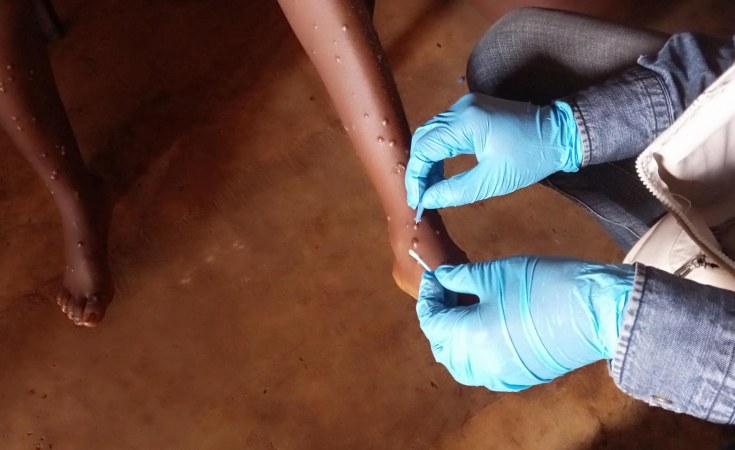The presence of the Mpox-clade-2a strain has been confirmed by the Director General of the National Public Health Institute of Liberia (NPHIL), Dr. Dougbeh Chris Nyan, with 11 cases currently under treatment.
Liberia has detected a total of 17 cases since the outbreak was declared a public emergency by the World Health Organization (WHO) and the Africa Center for Disease Control, in January this year, with samples confirming the circulation of clade 2a after gene sequencing at international labs.
Clade 2a is predominantly found in West Africa, distinct from clade 1, prevalent in Central Africa.
Dr. Nyan added that samples were sent from Liberia to the Nigeria Africa Center for Disease Control and the National Institute of Health in the U.S. for gene sequencing, which confirmed the circulation of clade 2a.
"Given the two batches of sequence data results, we can announce to the public that Liberia has a mpox virus clade 2a circulating in the country," he said at a news conference.
Mpox, formerly known as monkeypox, poses a health risk and preventive measures have been advised, such as hand washing and avoiding close contact with infected individuals.
Clade 2a of the mpox virus strain is mostly found in West Africa compared to clade 1, which is highly visible in Central Africa with the Democratic Republic of Congo recording more cases. Both clades are transferred mainly from animal to human. However, clade 2b, which was responsible for the outbreak in 2022, is similar to clade 2a.
Mpox was declared a health concern after affecting Burundi, Kenya, Rwanda, and Uganda. Mpox, formerly known as monkeypox, is a viral disease that can spread easily between people and from infected animals. It can spread through close contact such as touching, kissing, or sex, as well as through contaminated materials like sheets, clothing, and needles, according to the World Health Organization.
Since the outbreak NPHIL has reported confirmed cases in three counties, emphasizing the importance of early detection and reporting Mpox symptoms to a medical facility.
In a release, NPHIL said, "Since the beginning of this year, 2024, Liberia has accounted for 5 confirmed cases in 3 counties. In recent times, new cases have been confirmed in neighboring countries like Nigeria and Cote d'Ivoire in the region."
"The public is strongly advised to take the following preventive measures, such as constant hand washing, avoiding sex with persons suspected of having Mpox symptoms, avoiding close contact with persons suspected of Mpox symptoms, avoiding animal contact, and reporting to the nearest medical facility should you experience or observe any of the Mpox symptoms listed above."
In September 2024, the Institute confirmed the country's first case since the disease was declared a global health concern. One case was from 8 suspected cases that were tested, marking the first confirmed case in the country since the global outbreak was declared.
"Out of those 8 cases, two have two samples that went through our testing regimen. One of those came out positive," he said at a press conference to announce the issue. "However," he says, "the suspected cases are in isolation," Dr. Nyan said.
Dr. Nyan added that before detecting these cases, the institute could not verify which variant of the mpox virus was circulating in Liberia. However, through a request made to WHO, a team came to the country from Accra, Ghana, to provide training for diagnosticians and research technicians
"We had technical personnel that know about sequencing (that test that can give or show you what the genes look like of the circulating virus, but what we didn't have was the end point where you will be able to do the analysis to actually see the genre.) "
"Knowing the clabe that circulates in your country is to detect which vaccine can cover you."
According to him, it was during this training that three additional cases tested positive for the virus. "We did not want to immediately tell them why, because two of our partners had made some arrangements for us to send out those samples that tested positive. We sent those samples out, and some of those samples that were tested negative were also sent out in order to know what clade we have in Liberia."
Continuous training and support from international partners are contributing to enhanced diagnostic capabilities and tracking of the virus variants in Liberia. Epidemiologists and NPHIL staff are undergoing training to strengthen the country's response to the Mpox outbreak.
They are currently receiving training in sample collection, packaging, and rapid transfer of samples to the NPHIL's National Reference Lab. NPHIL staff are also being trained in medium- to intermediate-level field epidemiology training.


